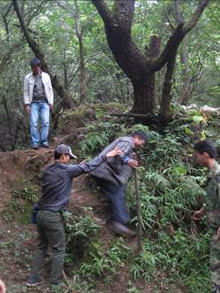|
||
|
By Angus Lam
Over the years, PCD have been promoting ecological farming: organising field-schools for farmers, motivating farmers’ interest in learning and discovering new knowledge in villages. We have come across many difficulties. Two years ago a farmer named Panda, in Yunnan’s Pingzhai Village, wrote an article. “What kind of knowledge do farmers, in fact, need?” Panda wrote. “The experts come to our village and decide on the knowledge we need after staying only a few days. Will this really be helpful to us?” His article made a great impact on outreach workers. This kind of challenges from farmers also happened to our partners promoting eco-farming in Sichuan villages. They claimed, “The reason farmers participate in our training programme is to meet with our organisation’s arrangement.”
Of course we don’t want to diminish farmers’ motivation to learn, and neither do we want to waste their limited time. Therefore, in order to let the diverse values of farming recover in the community at their own pace, our eco-farming team has organised two training courses since last year. We sought to benefit from the experience and knowledge of the training, as well as improve our training techniques and ecological-farming knowledge.
Sincerity matters most
During the second training programme, held in March this year, we invited a technician who promotes farming techniques in Sichuan’s Jianyang Village, Mr Yuan Yong, to share his 17 years of experience with us. He used an analogy of “three motions” to describe the psychological change in farmers on the training programme: highly emotional at the training centre, uncertain on the way home, then motionless having arrived home! We broke out laughing upon his poignant description. He shared with us his reflection: the key is to promote ourselves first before we promote our products. The farmers have to accept you before they will accept your knowledge. There are numerous techniques out there, but here there is only one person, so only one heart. Your sincerity will be rewarded with local farmers’ trust in you, so be humble, take off your shoes, roll up your trousers, and the farmers will take you like a son. To promote whole-heartedly, we should share joyfully, and thus communicate better with local farmers.
The next thing we shall do is write a concluding report on the two training programmes, and combine it with some external training modes and analytical methodology. Hopefully we will come up with some training modes that serve us better in promoting eco-farming. The training period is short, and yet we have all recognised the happiness of sharing and learning ecological farming within intensive courses.



